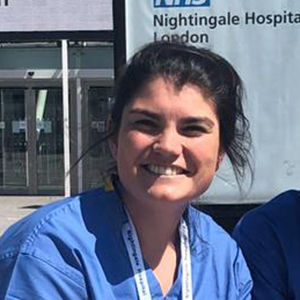London Nightingale Healthcare Science Workforce: Working together differently
 Over 150 healthcare scientists from across the UK came forward in just three days when clinical engineers put out a call for volunteers to help set up and manage critical care equipment for the Nightingale London earlier this year.
Over 150 healthcare scientists from across the UK came forward in just three days when clinical engineers put out a call for volunteers to help set up and manage critical care equipment for the Nightingale London earlier this year.
Becky East, a clinical scientist at Guy’s and St Thomas’ Hospital, was one of them: “One day we were doing our normal clinical work and the next we were helping to set up and organise the re-training of healthcare scientists to work in ICU. It was great to suddenly not feel so helpless in the fight against COVID-19.
“Two weeks later, 40 of us were at a bespoke three-day training course learning how to operate and troubleshoot ICU equipment, understand how ventilators interact with patients and perform clinical procedures. A few days later we had our first patients.
“The whole experience was exhausting but very rewarding. It has taught me a lot about the value of individuals who are both technically minded and clinically trained. We came from multiple clinical disciplines, but everyone was able to grasp rapidly how ventilators work and interact with respiratory function. We had a major impact in helping the medics and nurses ensure that equipment was kept working correctly and safely.”
Malcolm Birch, Head of Medical Physics and Clinical Engineering at Barts Health, explained: “We had to very rapidly create a clinical engineering support structure for the Nightingale and found that volunteer healthcare scientists, led by our experienced engineers, were able to build on their clinical experience and scientific training to learn the necessary new skills.
“Plus we had great support from local, regional and national healthcare science and professional networks, who helped us find volunteers, rapidly tailor existing courses and quickly develop new training material. In turn, we have been sharing our learning nationally.
“The whole experience underlines the importance of clinical engineering to frontline care and the wider value scientists bring to healthcare.”
For information, please contact ruth.thomsen@nhs.net
